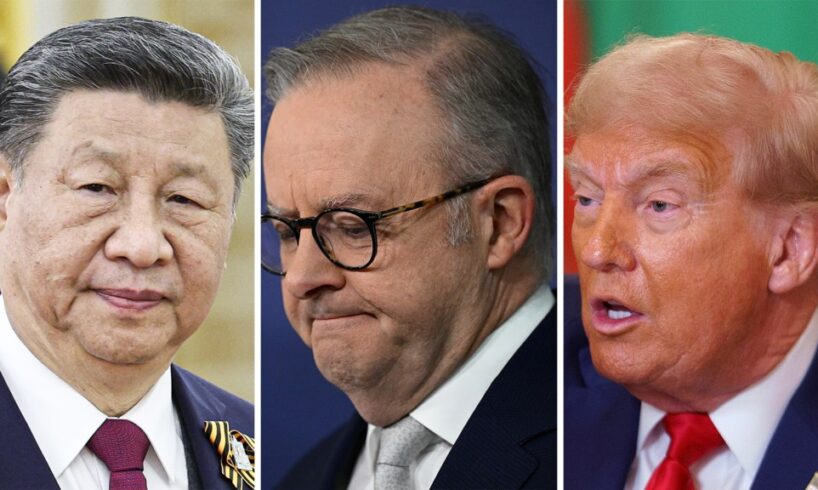
Whatever other faults Anthony Albanese might have, he’s played a strong hand regarding China. Without sacrificing any Australian interests, he brought to an end Xi Jinping’s pointless trade war on us and restored relations to an even level — indeed, to the point where China is now extending its hand in economic friendship.
The fact that Albanese wasn’t Scott Morrison or Peter Dutton helped — as did the Xi regime’s realisation that its whole “wolf-warrior” schtick was doing it no favours (a lesson Trump and his menagerie of freaks has yet to learn). But Albanese managed it while also achieving the kind of “step up” in the Pacific against China that Morrison talked of and never delivered — which comes with a hefty price tag, and likely will continue to do so. All the while, Albanese has locked Australia ever more tightly into the US military-industrial complex.
All of which is to say, Albanese has walked the China-US tightrope on which Australia has been perched for decades, and on the same level as John Howard, who managed to be Dubya’s loyal vassal while buttering up Hu Jintao. Though Albanese hasn’t yet joined the US in another illegal and disastrous foreign venture like Howard did, he’s allowed his defence minister to preemptively sign us up for the next one. And he’s avoided both Tony Abbott’s ludicrous enthusiasm for China (backed to the hilt by News Corp) and Morrison’s pointless fight-picking and demonisation.
Related Article Block Placeholder
Article ID: 1213435
That’s all good, but the game is about to get a lot harder or, to belabour the metaphor, the tightrope is about to become much thinner.
The steady rise of China both economically and militarily is a well-known story, peddled by both Sinophobes and Sinophiles. It’s a narrative that will persist for decades, even as China struggles with the impact of a population ageing more rapidly than our own — and the lack of a tradition of migration to make up for it. If anything, China’s growing technological dominance will strengthen its economic power still further — many of us are still stuck with the witless notion that China is only good at cheaply manufacturing — or copying — things we design in the West. Go ask DeepSeek about that.
The newer narrative is the one that began in January — the United States overthrowing not only the global economic order but its strategic order as well, by rejecting any role of the US as global security guarantor (except if you’re Benjamin Netanyahu) in place of the country acting as Mafia don extracting massive revenue from others for the offer of “protection”.
The head-in-the-sand response from the Albanese government, and most of the US-aligned security establishment, is that even if this marks a long-term shift in US strategic policy, the tradition of Australia-US mateship (a tradition that exists primarily in Australian minds, not across the Pacific) and Australia’s eagerness to offer its territory as Airstrip One for a war against China will guarantee we don’t end up like Ukraine.
There are a couple of problems with this argument. One is, as Malcolm Turnbull pointed out, you only have to look at who would succeed Trump from MAGA to realise that normal service is not about to be restored any time soon — especially if one of the Trump offspring decided that they should succeed dad instead of the man who once compared him to Hitler.
The other is that this may not just be another chaotic idea sprung from the confused recesses of Trump Sr’s addled brain, nor even a preoccupation of MAGA, but a long-term reversion of the United States to an older foreign policy.
Hugh White offers a compelling explanation of why the current historic moment is less MAGA and more Monroe in the latest Quarterly Essay. White might be reliably found in Beijing’s corner during security debates, but it’s difficult to argue against his explanation of how America’s interventionist foreign policy of the last hundred-odd years was a product of specific twentieth-century factors that have now vanished, leaving the US content to revert to a nineteenth-century policy of isolationism. No other power is in a position to threaten the homeland, and the costs of policing a global order have become too great. On this issue, Trump is not a chaotic Mafia boss so much as a reflection of historic forces, and splendid isolation awaits.
Related Article Block Placeholder
Article ID: 1213041
From a risk management perspective, both the standard narrative of the rise of China and White’s analysis are big problems for the major parties and the decidedly shallow gene pool that is Australia’s security establishment. There is a next-to-zero chance that China will not continue to be a key economic partner with Australia, and its strategic and military weight will almost certainly continue to grow. And even if White is wrong and Trump is a brief aberration from the glorious era of US empire that will resume normal service in a few years’ time, there is a significant chance that the decline of the US empire is a permanent feature of the 21st century. Meanwhile, China’s growing technological and military prowess will make it more than a match, even if the Americans remain committed to interventionism.
The standard response is that Australia needs to increase its defence spending, but to what exact end? To protect Australia against military threat from China? Or to act as part of the US empire against China? The two scenarios come with very different defence requirements (think Sam Roggeveen’s Echidna Strategy versus the debacle of AUKUS). The security establishment wants to have it both ways — they want increased defence spending occasioned by the growing reluctance of the US to guarantee allies’ security, but they also want the spending to be aimed at making us an integrated unit of US military power. It’s hard to reconcile the two.
And that leaves out the more likely scenario that there is no military conflict with China, but that it continues to grow in economic and technological power, and increasingly displaces the United States both regionally and globally. You get the sense from the Sinophobes and hawks that they’d prefer a war with China because that makes things very simple, rather than the knotty and demanding problem that is living permanently with an emerging superpower — a problem that requires complex thought and hard choices.
Facing up to that problem is a key moment in Australian foreign policy history. Since white invasion, Australia’s foreign policy has been based on being a vassal state to a superpower. But we’re running out of Anglophone superpowers to subject ourselves to. Life in the 21st century in our region is no longer amenable to such easy — and cheap — options. Now we have to grow up and do what real countries have long had to do, which is work out a way to navigate a path through powers great and middling alike, finding ways to achieve our national goals short of war or subordination. After nearly 240 years, our time as a colony is coming to an end, whether we like it or not.





